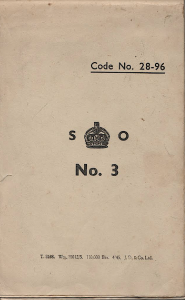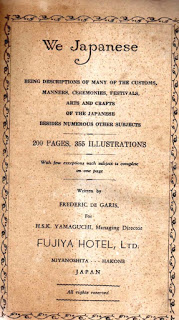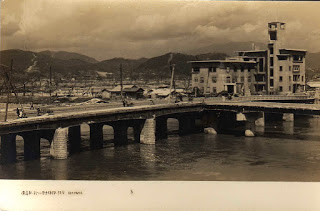Immediately after the end of WW 2 Germany was occupied by Allied forces and divided into 4 zones. The eastern quarter was given to the Russians and later became East Germany; the Americans occupied the south, the French had a tiny section to the south west, while the British were allotted most of the north.
It was exciting, therefore, to discover among a cache of ephemera at Jot HQ, a notebook issued to soldiers by the Stationery Office in which one soldier had recorded his brief visit to Altenau, a ski-resort in Lower Saxony in the centre of the British Zone, a few miles from the Russian Zone.
Little can be discerned from the brief journal, dating from the 6th to the 14th November 1948, concerning this anonymous soldier, who intersperses his entries with postcards of local scenery, apart from the fact that he seems to have been on a furlough for these eight days. When he is not relaxing at the ‘Holiday Inn’ in Altenau, sipping port and reading, he is exploring the local countryside. One of his aims seems to have been to penetrate the border into Russian occupied territory. He certainly appears to have regarded the Russians with a mixture of fear and curiosity, born perhaps of the stories that emerged about their cruelty and barbarity towards the Germans, both during the war and immediately afterwards. He regards the Germans themselves with less fear, although doubtless aware that the resentment felt by them towards occupying forces might be a source of danger, particularly at night. For security reasons all soldiers in the British Zone were under strict orders not to converse with any of the natives—a rule which our soldier assiduously observes.
The journal shows considerable literary qualities, which suggests that the soldier, who may possibly have been born in the early 1920s, might have become a writer or journalist at some point in the future. Take the entry for Saturday 6th November:
Ober: 2.15 p.m.
The blue dusk hid everything but the lights of the town and the black masses of the hills.
Tourist-like I climbed down the carriage-steps on to the six-inch platform. Where were all the other tourists ? In utter solitude I crunched down to the sub-way.
A waiting- room, its atmosphere thick with the smell of German humanity. One large T.C.V. ---one small sergeant. Was I to be alone at Altenau? Utter & sublime solitude?
Continue reading







